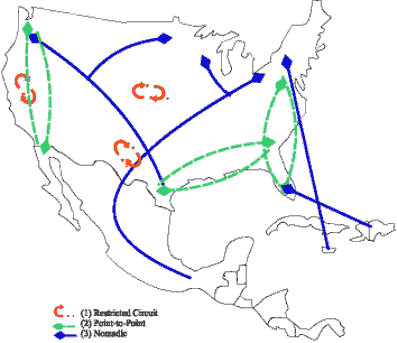
noun
- the process or act of migrating.
- a migratory movement: preparations for the migration.
- a number or body of persons or animals migrating together.
- Chemistry. a movement or change of position of atoms within a molecule.
- Physics. diffusion(def 3a).
noun
- the act or an instance of migrating
- a group of people, birds, etc, migrating in a body
- chem a movement of atoms, ions, or molecules, such as the motion of ions in solution under the influence of electric fields
n.1610s, of persons, 1640s of animals, from Latin migrationem (nominative migratio) “a removal, change of abode, migration,” noun of action from past participle stem of migrare “to move from one place to another,” probably originally *migwros, from PIE *meigw- (cf. Greek ameibein “to change”), from root *mei- “to change, go, move” (see mutable). Related: Migrational. That European birds migrate across the seas or to Asia was understood in the Middle Ages, but subsequently forgotten. Dr. Johnson held that swallows slept all winter in the beds of rivers, while the naturalist Morton (1703) stated that they migrated to the moon. As late as 1837 the “Kendal Mercury” “detailed the circumstance of a person having observed several Swallows emerging from Grasmere Lake, in the spring of that year, in the form of ‘bell-shaped bubbles,’ from each of which a Swallow burst forth ….” n.
- The moving from place to place, as of disease symptoms.
- diapedesis
- The movement of a tooth or teeth out of normal position.
- The movement of one or more atoms from one position to another within a molecule.
- The movement of ions between electrodes during electrolysis.
- The seasonal movement of a complete population of animals from one area to another. Migration is usually a response to changes in temperature, food supply, or the amount of daylight, and is often undertaken for the purpose of breeding. Mammals, insects, fish, and birds all migrate. The precise mechanism of navigation during migration is not fully understood, although for birds it is believed that sharp eyesight, sensibility to the Earth’s magnetic field, and the positions of the Sun and other stars may play a role.
- The movement of one atom or more, or of a double bond, from one position to another within a molecule.
- The movement of ions between electrodes during electrolysis.
 Liberal Dictionary English Dictionary
Liberal Dictionary English Dictionary